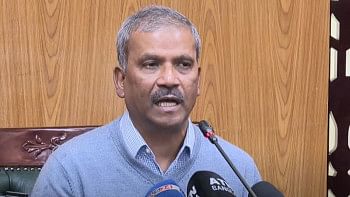New hope for disadvantaged women

Sitting in front of an electric sewing machine inside the Swanirvar Dhamsona Union Parishad (UP) building in Savar, Rozina was trying to stitch two pieces of cloths together.
The 40-year-old sex worker has been taking sewing training since the first week of October to develop an alternative livelihood skills.
“I have been trying to leave my current profession for the last three to four years but failed as I had no other means of earning a living,” she said.
At the end of the training, Rozina will receive a high-quality electric sewing machine with which she hopes to start a new career.
Swanirvar Dhamsona UP arranged the three-month long training program for the disadvantaged women of the union with fund from the Local Government Support Project (LGSP).
Currently, 30 women, including 17 sex workers like Rozina, aged between 25 and 50 years, are receiving the training five-days a week in two shifts--from 10:00am to 1:00pm and from 2:00pm to 5:00pm.
Rozina narrated her story to The Daily Star, when this correspondent visited the training site early November.
She recounted how she had to drop out of school and was married off at the early age of 12. Five years after her marriage, she left her abusive husband’s house following the birth of her son.
Initially, she went to live with her parents, but following her father’s death she left for Dhaka for a livelihood.
Unable to make a living in the capital, she returned to Savar and started working as a house-help, she said.
Unfortunately, she often faced sexual abuse by her male employers, at many of her workplaces, she alleged.
In 2004, Rozina came in contact with a couple, who allegedly confined her at their house along with other women and forced her into sex trade. After escaping from that place, Rozina decided to join prostitution.
“I rationalised my decision thinking that at least I will be able to earn some money,” she said.
Now that her son has grown-up, and is seeking admission at a university, Rozina do not want to continue in her present line of work.
“If I get a sewing machine and some financial help, I will leave the profession,” she told this correspondent.
Fifty-year-old Komola, echoed similar hope when talking to The Daily Star.
“I used to work at a garments factory but was terminated from the job because I could not sign my name,” she said.
Both Komola and her 35-year-old sister, also mother of a child, never went to school and had to enter the prostitution profession 20 years ago for survival.
Now the sisters want to leave that work and learn to sew for a different livelihood.
The sex-workers were selected for the training through Caritas Bangladesh’s Caritas Prochesta Project.
The non-government organisation (NGO) has been arranging different services for the sex workers for the last 10 years including treatment, shelter, legal aid, training and rehabilitation.
Faced with fund crisis due to shortage of donors, the NGO recently shared their problems with officials of Local Government Support Project and the chairman of Swanirvar Dhamsona Union Parishad, said Farid Ahmed Khan, project in charge of Caritas’s Prochesta Project.
He said, “Hearing our story, they arranged the three-month sewing training with money from Local Government Support Project-3 (LGSP-3).”
The other trainees mostly survivors of physical, mental and sexual abuse were selected by the UP members and the chairman.
Farida is among them. Five years ago, her husband left her with two children, and she took up construction work to feed her family.
“It was getting very difficult for me to continue construction work. I was searching an alternative job and thought that getting a sewing machine will be very helpful,” she said.
Chairman of Shawnirvor Dhamshona UP Saiful Islam told The Daily Star that he took initiative for the training to help the disadvantaged women of the society.
He said, “People do not view sex workers positively. To bring them back to the mainstream, we arranged the sewing training, and will continue if more women wish to receive the training.”
He will provide financial help personally if any sex worker needed it to become self-reliant after the training, he added.
A 10-member team of representatives of the World Bank, that partially funds LGSP-3, visited the training site on October 26 and expressed their satisfaction.
Disclaimer: The names of the trainees have been changed to protect their privacy.


 For all latest news, follow The Daily Star's Google News channel.
For all latest news, follow The Daily Star's Google News channel. 



Comments